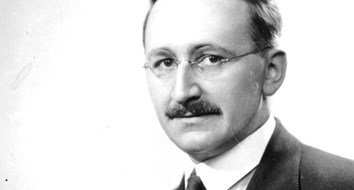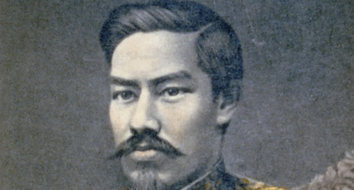When George Orwell’s Animal Farm was first published on August 17 in 1945, World War II in Europe had concluded only three months before. It would end in the Pacific in a matter of days. Britain and the United States were still allied with Stalin’s Soviet Union. To write nasty things about the regime in Moscow was not politically correct.
For that very reason, four different publishers turned the book down before Orwell found one willing to take a chance on it (Secker and Warburg). A novel about a farm rebellion in which the animals overthrow the humans in the name of egalitarianism, only to degenerate into a bloody tyranny, was aimed squarely at the Soviet “workers’ paradise.”
For another reason, the world was almost deprived of Animal Farm altogether. After a German bomb hit Orwell’s London home in 1944, he feared the manuscript was lost until he luckily found it in the wreckage, intact.
Orwell is remembered today primarily for Animal Farm and his dystopian nightmare, 1984. Both depict societies—a four-legged one and a two-legged one—in which truth and freedom are shackled by concentrated power, cynically sprinkled with good intentions and promises of equality.
George Orwell, to his credit, was a friend of freedom of speech and press and an unrelenting foe of totalitarianism and censorship. He would shudder if you accused him of being a communist. But if you called him a socialist, he might thank you and then issue objections to the authoritarian things socialists like to do.
To apply an analogy from current events, this is not far removed from someone declaring, “I don’t like COVID but I’m fine with its Delta variant.”
In other words, Orwell could never bring himself to fully appreciate this historical fact: Concentrating power for any reason is inherently dangerous. It is seductive and corrupting. It is not rendered harmless by majority vote or by the grandiloquent rhetoric of its practitioners.
All the way to his untimely death from tuberculosis at age 46 in 1950, Orwell never disavowed a personal affection for “democratic socialism.” That’s another way of saying that he failed to see that in practice, the second word (socialism) will always be at war with the first (democratic)—because that’s what concentrated power does by its very nature.
How many more times must we bear witness to socialists coming to power by the democratic process and then hanging on to power by undemocratic means? Latin American history is full of such examples, from Hugo Chavez and Nicolas Maduro in Venezuela to Daniel Ortega in Nicaragua. And don’t forget that in Europe, the national socialist Adolf Hitler competed in elections until he got to the top and decided that elections were a nuisance.
Here in the US, it’s not a coincidence that the same “democratic socialists” who call for economic equality and lots of “free stuff” from the government are also allied with the cancel culture that seeks to shut people up.
Some might say that Orwell was naïve in this regard; I prefer to view him as a work in progress, as a man of basic honesty and integrity who was bound to put two and two together sooner or later. A sign that he was making intellectual progress in that regard is this passage from his 1944 review of F. A. Hayek’s The Road to Serfdom:
Professor Hayek's thesis is that Socialism inevitably leads to despotism, and that in Germany the Nazis were able to succeed because the Socialists had already done most of their work for them, especially the intellectual work of weakening the desire for liberty. By bringing the whole of life under the control of the State, Socialism necessarily gives power to an inner ring of bureaucrats, who in almost every case will be men who want power for its own sake and will stop at nothing in order to retain it. Britain, he says, is now going the same road as Germany, with the left-wing intelligentsia in the van and the Tory Party a good second. The only salvation lies in returning to an unplanned economy, free competition, and emphasis on liberty rather than on security. In the negative part of Professor Hayek’s thesis there is a great deal of truth. It cannot be said too often—at any rate, it is not being said nearly often enough—that collectivism is not inherently democratic, but, on the contrary, gives to a tyrannical minority such powers as the Spanish Inquisitors never dreamed of.
If he had lived another 30 years, Orwell would have seen democratic socialism cripple his own Britain into the status of “sick man of Europe,” necessitating the Thatcher revolution that partially undid it.
In his 2016 essay for FEE, “Orwell’s Fatal Attraction to Democratic Socialism,” Joey Clark points out that “George Orwell is not read today for his economic insights. No, he is read for his keen moral instincts and his intellectual integrity.”
If he had lived just another decade, I think Orwell might well have evolved into a very thoughtful libertarian. In hoping that a socialist society could be free and democratic and remain so, he was a wishful thinker who just needed a little more time to grow up and get real. He possessed the core integrity, I believe, that would have eventually put him on the right track.
As one might imagine of a man holding contradictory beliefs, Orwell produced some insights that a socialist could embrace, and others that a non-socialist could endorse. He was far more eloquent in expressing the latter, perhaps indicating that a latent intellectual honesty was shining through the fog. I share some of those insights with readers here.
As you peruse them, ask yourself, “If a man could pen such wisdom, wasn’t it only a matter of time and thought before he embraced liberty, limited government, and free markets?”
The most effective way to destroy people is to deny and obliterate their own understanding of their history.
_____
These people don’t see that if you encourage totalitarian methods, the time may come when they will be used against you instead of for you.
_____
In addition to this there is the horrible—the really disquieting—prevalence of cranks wherever Socialists are gathered together. One sometimes gets the impression that the mere words 'Socialism' and 'Communism' draw towards them with magnetic force every fruit-juice drinker, nudist, sandal-wearer, sex-maniac, Quaker, 'Nature Cure' quack, pacifist, and feminist in England.
_____
One is almost driven to the cynical conclusion that men are only decent when they are powerless.
_____
It is quite possible that we are descending into an age in which two plus two will make five when the Leader says so.
_____
[T]here is something wrong with a regime that requires a pyramid of corpses every few years.
_____
The real division is not between conservatives and revolutionaries but between authoritarians and libertarians.
_____
If liberty means anything at all, it means the right to tell people what they do not want to hear.
_____
Threats to freedom of speech, writing and action, though often trivial in isolation, are cumulative in their effect and, unless checked, lead to a general disrespect for the rights of the citizen.
_____
I always disagree, however, when people end up saying that we can only combat Communism, Fascism or what not if we develop an equal fanaticism. It appears to me that one defeats the fanatic precisely by not being a fanatic oneself, but on the contrary by using one's intelligence.
_____
What is needed is the right to print what one believes to be true, without having to fear bullying or blackmail from any side.
_____
Do remember that dishonesty and cowardice always have to be paid for. Don’t imagine that for years on end you can make yourself the boot-licking propagandist of the Soviet régime, or any other régime, and then suddenly return to mental decency. Once a whore, always a whore.
_____
A totalitarian state is in effect a theocracy, and its ruling caste, in order to keep its position, has to be thought of as infallible. But since, in practice, no one is infallible, it is frequently necessary to rearrange past events in order to show that this or that mistake was not made, or that this or that imaginary triumph actually happened. Then, again, every major change in policy demands a corresponding change of doctrine and a revaluation of prominent historical figures.
For additional information, see:
Why George Orwell’s Warning on ‘Self-Censorship’ is More Relevant Than Ever by Brad Polumbo
Two Ways Our World Resembles “1984” by Jon Miltimore
10 Things You Never Knew about Orwell’s 1984 by Anna Matthews
Orwell’s Fatal Attraction to Democratic Socialism by Joey Clark
Orwell’s ‘1984’: How to Misread a Classic by Shawnna Morris





